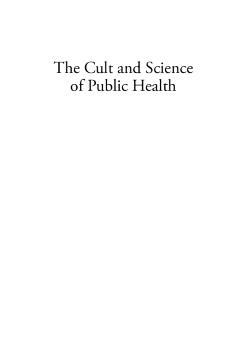
Additional Information
Book Details
Abstract
In contemporary manifestations of public health rituals and events, people are being increasingly united around what they hold in common—their material being and humanity. As a cult of humanity, public health provides a moral force in society that replaces ‘traditional’ religions in times of great diversity or heterogeneity of peoples, activities and desires. This is in contrast to public health’s foundation in science, particularly the science of epidemiology. The rigid rules of ‘scientific evidence’ used to determine the cause of illness and disease can work against the most vulnerable in society by putting sectors of the population, such as underrepresented workers, at a disadvantage. This study focuses on this tension between traditional science and the changing vision articulated within public health (and across many disciplines) that calls for a collective response to uncontrolled capitalism and unremitting globalization, and to the way in which health inequalities and their association with social inequalities provides a political rhetoric that calls for a new redistributive social programme. Drawing on decades of research, the author argues that public health is both a cult and a science of contemporary society.
Kevin Dew is Professor of Sociology in the School of Social and Cultural Studies at Victoria University of Wellington, New Zealand. In 2007 he was awarded the inaugural scholarship award from the Sociological Association of Aotearoa/New Zealand for contributions to New Zealand sociology.
“…an extremely detailed, structured and intelligent investigation into the vast, constantly changing world of public health. Dew excels at addressing the many different variants of public health as a whole: from epidemiology and social determinants to expansive campaigns focused on large populations and environments where the lines between hazard and health become blurred. Where other pieces of work of this nature tend to read as broad and one-sided, Dew has provided a stellar account of the importance of public health in our world as well as the effect the role of public health has on our societies.” · Social Analysis
“The main interests of this compelling book are threefold. Firstly, its interest lies in the impressive range of debate and theory that it draws upon to build its argument about the nature of public health. Secondly, the argument presented in the book encourages us to think about public health in relation to society and its beliefs…Thirdly,… it conceptualizes public health not only as an instrument of power, but also as an instrument of morality, thus allowing for a more positive assessment of the function of public health whilst still highlighting its ambivalent nature.” · Journal of the Royal Anthropological Institute
“…an outstanding overview of public health, neatly traversing complex theoretical fields and developing a fascinating account of the moral significance of modern public health and its rituals…the book truly breaks new ground in allowing us to think through the complexities and paradoxes of public health as it acts at one time to free and protect the individual and at others to tend towards a moral absolutism of control.” · Kevin White, Australian National University, Canberra
“…the text is impressive, in terms of the amount of material brought together and the accessibility afforded to potential readers.” · Mike Bury, Royal Holloway, University of London
